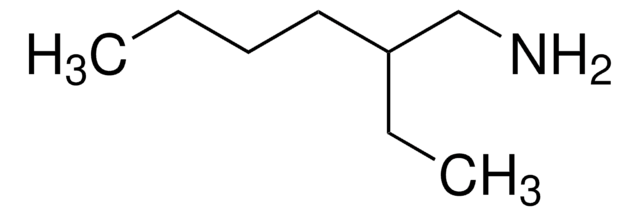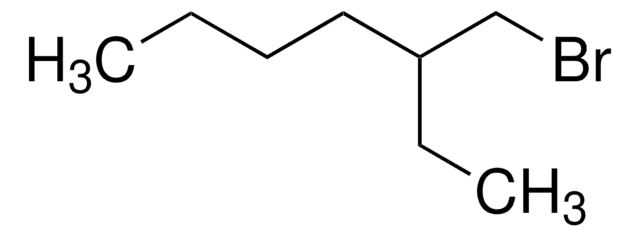538051
2-Etil-1-hexanol
≥99.6%
Sinónimos:
Alcohol isooctílico
About This Item
Productos recomendados
vapor density
4.49 (vs air)
Quality Level
vapor pressure
0.2 mmHg ( 20 °C)
assay
≥99.6%
autoignition temp.
550 °F
expl. lim.
0.88 %, 104 °F
9.7 %, 113 °F
refractive index
n20/D 1.431 (lit.)
bp
183-186 °C (lit.)
mp
−76 °C (lit.)
solubility
water: soluble g/L at 20 °C
density
0.833 g/mL at 25 °C (lit.)
functional group
hydroxyl
SMILES string
CCCCC(CC)CO
InChI
1S/C8H18O/c1-3-5-6-8(4-2)7-9/h8-9H,3-7H2,1-2H3
InChI key
YIWUKEYIRIRTPP-UHFFFAOYSA-N
¿Está buscando productos similares? Visita Guía de comparación de productos
Categorías relacionadas
General description
Application
signalword
Warning
hcodes
Hazard Classifications
Acute Tox. 4 Inhalation - Eye Irrit. 2 - Skin Irrit. 2 - STOT SE 3
target_organs
Respiratory system
Storage Class
10 - Combustible liquids
wgk_germany
WGK 1
flash_point_f
167.0 °F - closed cup
flash_point_c
75 °C - closed cup
ppe
Eyeshields, Faceshields, Gloves, type ABEK (EN14387) respirator filter
Elija entre una de las versiones más recientes:
¿Ya tiene este producto?
Encuentre la documentación para los productos que ha comprado recientemente en la Biblioteca de documentos.
Los clientes también vieron
Nuestro equipo de científicos tiene experiencia en todas las áreas de investigación: Ciencias de la vida, Ciencia de los materiales, Síntesis química, Cromatografía, Analítica y muchas otras.
Póngase en contacto con el Servicio técnico













